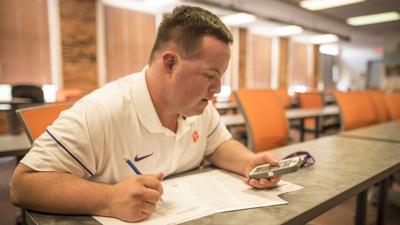An app that helps people with intellectual impairments get through workplace tasks is showing promising results as a program at Clemson University attempts to prepare students with disabilities for the labor force.
The application, called Task Analysis Life, has a simple design. It allows parents, work supervisors or teachers to input walk throughs, complete with images and text reminders.
And though it requires some effort from supervisors to input lists of instructions to help people get through tasks, research at Clemson indicates it does help them complete jobs repeatedly and with less help.
Researchers tested the efficacy of the app and found people with the disabilities who used it were able to complete tasks more efficiently than those who didn't. Everyone who participated in the research had an IQ of between 40 and 54. They were tasked with using scanners, shredders and copiers for the trial.
The piece of software is relevant considering challenges for people with intellectual disabilities to find work. Those disabilities include Down Syndrome, for instance, and present if the person has an IQ of below 70.
Thirty-four percent of working-age adults with intellectual disabilities are employed, compared to about three-quarters of adults without disabilities, a study conducted at the University of Massachusetts in 2014 found.
A recent report from the Bureau of Labor Statistics shows the unemployment rate for people with disabilities was 9.2 percent in 2017, twice that of people without disabilities. The agency did not distinguish between intellectual disabilities and other sorts, however.
Joe Ryan is the founder and executive director of ClemsonLIFE, a program specifically designed for students with intellectual disabilities that has partnerships with 30 job sites.
About 96 percent of the program's graduates are working, he said. The goal of the app is to help the students — and others — stay focused on their jobs and not have to ask to be reminded of how to do them.
"The problem with intellectual disabilities is when they forget something, they typically don’t ask for help," Ryan said. "They kind of just hide ... Rather than rely on a job coach, it’s much more natural to go to your phone."
ESPN basketball analyst Deb Antonelli's son Frankie is enrolled in ClemsonLIFE. They are Charleston-area residents and Frankie works as a DJ, Antonelli said.
She noticed her son needs supervision, and constant redirection to keep focused on what he is doing. The app has helped him with those issues, she said.
Antonelli input a tutorial for French toast and workouts for the gym. And she said he used it to learn to scan and shred documents at Clemson.
"We’re all about trying to help find a solution, not be ones that complain," she said.








